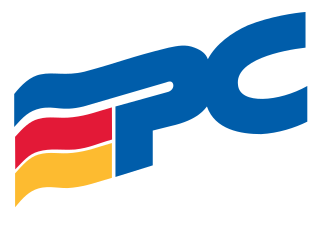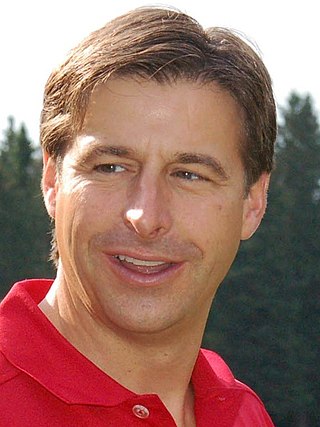
Bernard Lord is a Canadian lawyer,business executive and former politician. He served as the 30th premier of New Brunswick from 1999 to 2006. Lord was appointed as board chair of Ontario Power Generation in 2014.

Shawn Michael Graham is a Canadian politician,who served as the 31st premier of New Brunswick from 2006 to 2010. He was elected leader of the New Brunswick Liberal Party in 2002 and became premier after his party captured a majority of seats in the 2006 election. After being elected,Graham initiated a number of changes to provincial policy especially in the areas of health care,education and energy. His party was defeated in the New Brunswick provincial election held September 27,2010,and Graham resigned as Liberal leader on November 9,2010.
The New Brunswick New Democratic Party is a social democratic political party in New Brunswick,Canada. It is the provincial section of the federal New Democratic Party.
Alvin Curling is a Jamaican-born Canadian politician. He was Canada's envoy to the Dominican Republic from 2005 to 2006. A former politician in Ontario,Canada,he was Speaker of the Legislative Assembly of Ontario until he resigned on August 19,2005 to accept his diplomatic appointment. He had been a Liberal MPP for twenty years,from 1985 to 2005.

The Progressive Conservative Party of New Brunswick is a centre to centre-right conservative political party in the Canadian province of New Brunswick. The party has its origins in the pre-Canadian confederation Conservative Party that opposed the granting of responsible government to the colony. It has historically followed the Red Tory tradition. The Progressive Conservative Party currently leads the provincial government since 2018 under Premier Blaine Higgs.

The 2006 New Brunswick general election was held on September 18,2006,to elect 55 members to the 56th New Brunswick Legislative Assembly,the governing house of the province of New Brunswick,Canada.
The New Brunswick Confederation of Regions Party was a political party in the Province of New Brunswick,Canada. It was the only branch of the Confederation of Regions Party of Canada to win any seats. It held official status in the Legislative Assembly between 1991 and 1995,before losing all its seats in the following election.
Antoon J. "Tony" Huntjens is a former teacher and New Brunswick politician. A resident of St. Stephen,New Brunswick,where he taught High School for thirty-three years,he was a member of the Legislative Assembly of New Brunswick for the riding of Western Charlotte.

Trevor Arthur Holder is a New Brunswick politician. He served as a member of the Legislative Assembly of New Brunswick from 1999 to 2024. At the time of his resignation,he was the longest serving member of the legislature.
Brent Taylor is a former Canadian politician,educator,newspaper columnist,disc jockey,and YouTuber. He was a member of the Legislative Assembly of New Brunswick from 1991 to 1995. Additionally,he was the Progressive Conservative Party's candidate for the Southwest Miramichi riding,which he previously represented,in the 2006 election when he was unsuccessful in being re-elected. Before entering politics,he was a radio personality for a brief time in the 1980s,and after his departure from the Legislative Assembly in 1995 he worked as a newspaper columnist and educator. He returned to government work in 2007 when he took a job with Veterans Affairs Canada,where he remains employed as of 2020.
Peter Mesheau is a politician in New Brunswick,Canada. He represented the electoral district of Tantramar in the Legislative Assembly of New Brunswick from 1997 to 2006.

The 55th New Brunswick Legislative Assembly was created following a general election in 2003 and was dissolved on August 18,2006.

The 2010 New Brunswick general election was held on September 27,2010,to elect 55 members to the 57th New Brunswick Legislative Assembly,the governing house of the province of New Brunswick,Canada. The incumbent Liberal government won 13 seats,while the opposition Progressive Conservatives won a landslide majority of 42 seats in the legislature. As leader of the PC party,David Alward became New Brunswick's 32nd premier.
The Progressive Conservative Party of New Brunswick held a leadership election in 2008,following the resignation of Bernard Lord on December 13,2006. The Conservatives had last had a leadership election in 1997.

New Brunswick has had,since the Legislative Council was abolished by an act passed on 16 April 1891,a unicameral legislature called the New Brunswick Legislature,consisting of the Lieutenant Governor and the Legislative Assembly with 49 seats. The legislature functions according to the Westminster system of government. Elections are now held at least every five years but may be called at any time by the lieutenant governor on consultation with the premier.

The Speaker of the Legislative Assembly of New Brunswick is the presiding officer of the provincial legislature. Since 1994 the position has been elected by MLAs using a secret ballot. Previously,the Speaker had been appointed by motion of the house,in practice moved by the Premier of New Brunswick usually after consultation with the Leader of the Opposition. Shirley Dysart was the first Speaker to be elected by his or her peers.

The 2014 New Brunswick general election was held on September 22,2014,to elect 49 members to the 58th New Brunswick Legislative Assembly,the governing house of the province of New Brunswick,Canada.

The 2018 New Brunswick general election was held on September 24,2018,to elect the 49 members of the 59th New Brunswick Legislature,the governing house of the province of New Brunswick,Canada.

Dominic William Cardy is a Canadian politician,interim leader of the Canadian Future Party and a former Member of the Legislative Assembly of New Brunswick (2018-2024) and provincial cabinet minister (2018-2022).

The 2024 New Brunswick general election will be held on October 21,2024,where 49 members will be elected to the New Brunswick Legislative Assembly. It was formally called upon the dissolution of the 60th Assembly on September 19,2024.











